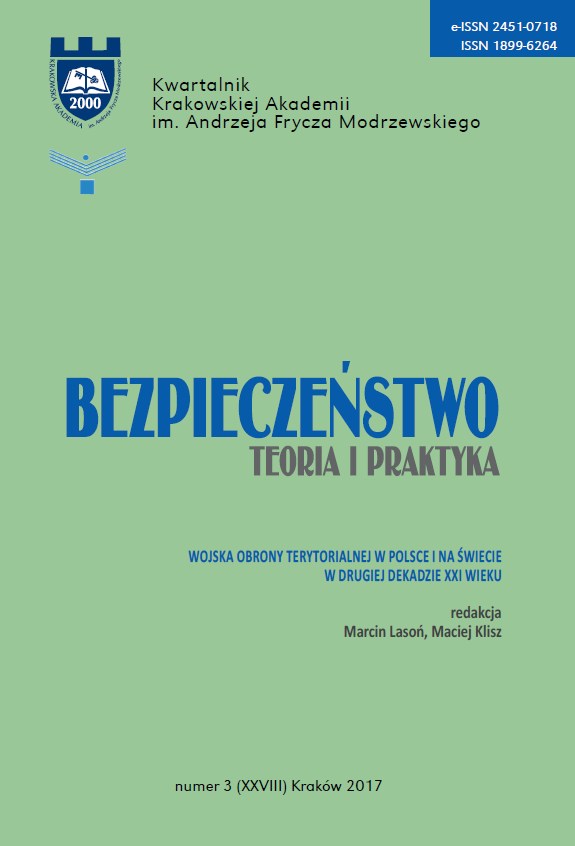Obrona terytorialna i wojska obrony terytorialnej w myśli politycznej Polski współczesnej
Territorial defence and Territorial Defence Forces in the political thought of contemporary Poland
Author(s): Ewa MajSubject(s): Security and defense, Military policy, Geopolitics
Published by: Oficyna Wydawnicza AFM Uniwersytetu Andrzeja Frycza Modrzewskiego w Krakowie
Keywords: political thought; territorial defence; Territorial Defence Forces; historical patterns of TD; political ideals and values; geopolitics
Summary/Abstract: The thematic area of territorial defence (TD) was one of the priorities lying at the centre of the national defence of Poland, not only before the 1999 accession to NATO, but also in the 21st Century, when Poland continued to strengthen its defensive potential. This subject matter became reflected in political thought and its various ideological trends. While used metaphorically in the title, the notion of “contemporaneity” acquires a more specific form when built around the time periods discussed in the article. The starting point is 1989, the kick-off year for changes in the political system of Poland, and ending in 2015, when, along with the formation of a coalition cabinet led by the Law and Justice Party, a new political quality came into being. In objective terms, one can differentiate between political thought originating in factions (structural objectivity) and that developed by ideologues (personal objectivity), with consideration given to its transmission channels (the media providing general information, political columnists, etc.). As regards the ideological aspect, the willingness to develop TD-related visions emerged in conservative, liberal, peasant, nationalist, Catholic-nationalist, socio-democratic, and socialist circles. This article aims to provide answers to three research questions. First, focus is made on the ways in which political thought has been used to account for the concept of territorial defence. Second, the article brings forward issues centred around the existence of historical patterns of TD and their implications on the present times. Third, the article addresses the mode of the articulation of TD following the implementation of an appropriate definition procedure. Answering the first two questions made it possible to identify the common ground for views expressed by the various subjects of political thought. The arguments in favour of TD were of a general nature, due to the defensive status quo of Poland, largely determined by geopolitical considerations. The subjects of political thought in their generality were aware of the threats to the security of the nation and the State. The dramatic experiences suffered in the 20th Century from uprisings, wars and occupations encouraged the consolidation of some forms of self-defence. As far as definition issues are considered, these caused discrepancies in nomenclature, ideals and values, symbols and political rituals, and, finally, tasks attributable to TD. The abstraction level exhibited general reflections of a patriotic, humanitarian, and universal nature, which were further complemented by right-wing thought with references to such notions as nation, family and religious beliefs. At the practical level, the originators of political thought commented on specific strategic and operational, tactical, and organisational issues. Irrespective of ideological affiliations, stress was invariably placed on the importance of TD when it came to protecting citizens and their property in extreme conditions (natural disaster, massive technical failure, war, etc.).
Journal: Bezpieczeństwo. Teoria i Praktyka
- Issue Year: XXVIII/2017
- Issue No: 3
- Page Range: 297-316
- Page Count: 20
- Language: Polish

